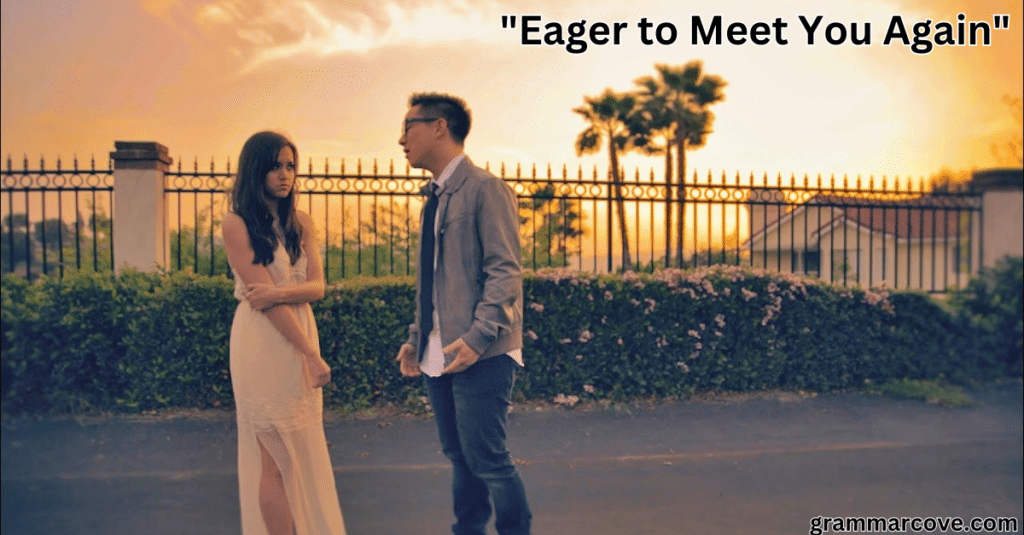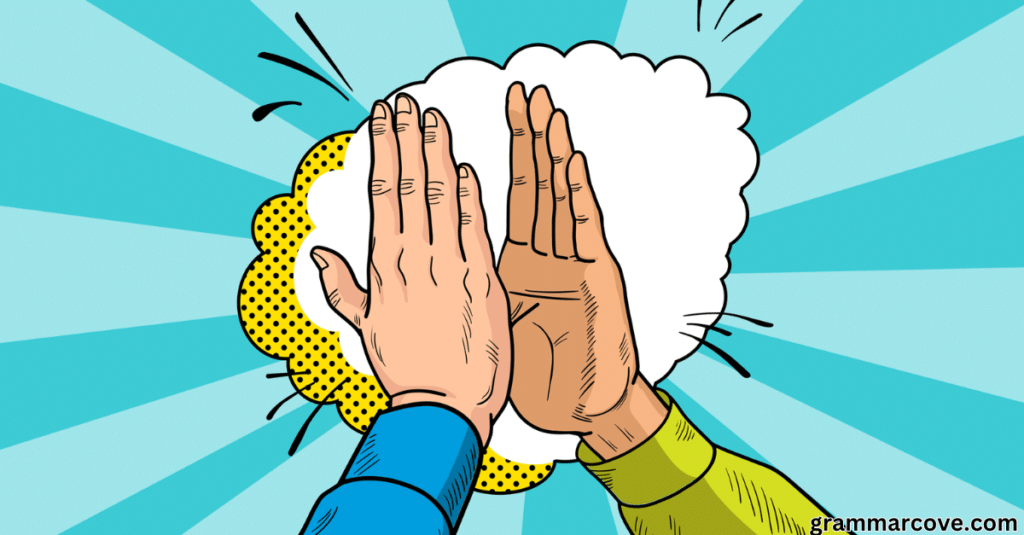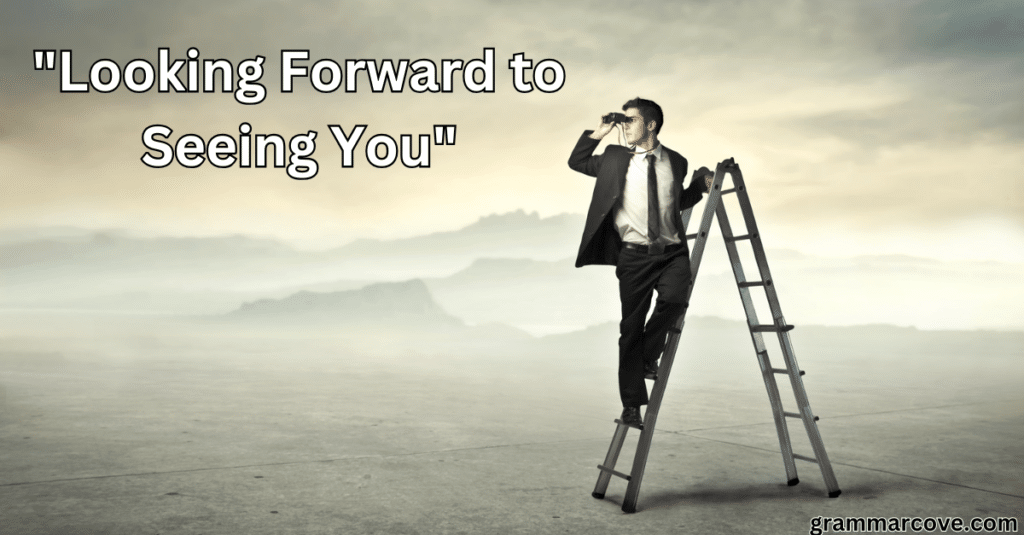The phrase “Looking forward to seeing you” is a popular choice when you want to convey excitement about a future meeting. However, using this phrase repeatedly can feel a bit monotonous. There are many friendly alternatives that can add a touch of personality, warmth, or professionalism, depending on the context. Whether you’re engaging in casual greetings, professional communication, or simply expressing your enthusiasm for an upcoming event, these options can help diversify your language.
Here are ten variations of anticipation, each with an example to show how you can incorporate them effectively.
1. “Can’t Wait to Catch Up”
This casual and friendly way to express excitement about meeting someone—using phrases like “other ways to say looking forward to seeing you”—works well in informal settings, such as with friends or family, and even for colleagues you have a close relationship with. This approach emphasizes your eagerness to reconnect.
Example Email:
Hi Sarah,
I hope you’ve been doing well. Can’t wait to catch up next week at the conference. It’s been too long since we last saw each other, and I’m sure we’ll have a lot to talk about!
See you soon,
John
Use case: This phrase is ideal for social interactions and casual scenarios where the relationship is more relaxed.
2. “Eager to Meet You Again”

If you’re expressing excitement to reconnect with someone you’ve met before, “eager to meet you again” serves as a thoughtful expression that conveys your enthusiasm. It sounds more formal than “can’t wait,” making it suitable for semi-professional contexts.
Example Email:
Dear Mr. Anderson,
I hope all is well on your end. I’m writing to confirm our meeting on Thursday. I’m eager to meet you again and continue our discussion about the project. Looking forward to the progress we can make together.
Best regards,
Claire
Use case: This works well in professional communication where you need to balance excitement with professionalism.
3. “Excited About Our Upcoming Meeting”
This phrase directly incorporates the key phrase “upcoming meetings” and is perfect for a professional communication setting. It allows you to express enthusiasm while maintaining a formal tone.
Example Email:
Hi James,
I wanted to let you know that I’m excited about our upcoming meeting next Monday. I believe it will be a productive session, and I’m looking forward to discussing the project in detail.
See you soon,
Rachel
Use case: Ideal for professional settings, especially when scheduling or confirming appointments, interviews, or business meetings.
4. “Anticipating Our Time Together”
Using the word “anticipating” adds a sense of thoughtful expression and anticipation phrases to your communication. It conveys a forward-looking sentiment without being too casual.
Example Email:
Dear Dr. Smith,
I hope you’re doing well. Just wanted to send a quick note to let you know that I’m anticipating our time together at the upcoming symposium. Using “other ways to say looking forward to seeing you,” it will be a pleasure to exchange insights on the latest research findings.
Warm regards,
Laura
Use case: Suitable for professional communication, especially in more formal situations or with individuals you respect and admire.
5. “Looking Forward to Our Reunion”
The word “reunion” gives this phrase an added emotional touch, ideal for situations where you’re reconnecting with someone after a long time. It’s a reunion expression that adds depth to your anticipation.
Example Email:
Hi Carlos,
It’s been way too long! Looking forward to our reunion next month when you’re back in town. We definitely need to catch up over dinner and talk about old times.
Best,
Ana
Use case: Perfect for personal connections where the relationship has a history, such as old friends, former colleagues, or family members.
6. “Thrilled to See You Soon”
If you want to infuse some extra excitement, “thrilled to see you soon” emphasizes a high level of enthusiasm and emotional engagement. It’s suitable for both personal and semi-formal professional interactions, making it a great alternative among “other ways to say looking forward to seeing you.”
Example Email:
Hi Emily,
I just wanted to drop you a quick line to say that I’m thrilled to see you soon at the upcoming training session. I know it’s going to be a valuable experience, and I’m eager to share some new strategies with you.
Cheers,
Tom
Use case: Suitable for engaging language in situations where you want to express genuine excitement, especially in social interactions or team settings.
7. “Counting Down the Days Until We Meet”
This phrase adds an element of excitement and a sense of anticipation, especially when you want to convey that you’re actively looking forward to the event. It’s an engaging way to show that you’re excited about the time ahead.
Example Email:
Dear Olivia,
I just wanted to let you know that I’m counting down the days until we meet for the annual summit. It’s always a pleasure catching up with you, and I’m sure this year will be no different.
See you soon,
Benjamin
Use case: Works well in both personal and professional scenarios where there is a strong emotional connection or excitement about a planned event.
8. “Can’t Wait for Our Time Together”

Similar to “can’t wait to catch up,” this phrase emphasizes the personal nature of the meeting. It’s a more informal communication style that adds a warm and welcoming touch.
Example Email:
Hey Mark,
Can’t wait for our time together next weekend. It feels like it’s been ages since we last saw each other. I’m looking forward to catching up and enjoying some quality time.
Best,
Samantha
Use case: Suitable for informal settings, such as meeting friends or family, where the tone can be casual and warm.
9. “Looking Forward to Our Get-Together”
“Get-together” has a casual, relaxed vibe that works well for friends, informal business gatherings, or casual work settings. It’s perfect for situations where you want to convey a friendly tone.
Example Email:
Hi Lauren,
I’m looking forward to our get-together next Friday. It’s been a while since our last lunch date, and I’m excited to catch up and hear what you’ve been up to.
Talk soon,
Jenna
Use case: Great for social interactions or casual reunion expressions, whether it’s with friends or co-workers outside a formal work environment.
10. “It’ll Be Great to See You Again”
This is a versatile phrase that can be used in various situations. It maintains a balance between casual and formal, making it suitable for almost any setting.
Example Email:
Hi George,
Just a quick note to say that it’ll be great to see you again at the upcoming client meeting. I’m sure we’ll have a productive discussion, and I look forward to catching up afterward.
Best wishes,
Diane
Use case: Works for both professional communication and personal connections, striking the right tone in various contexts.
How to Choose the Right Alternative
When deciding which warm invitation to use, consider the nature of your relationship with the recipient and the context of your communication. For instance:
- Casual greetings are ideal for informal settings, friends, or family.
- Professional communication requires expressions that are both friendly and respectful.
- If there’s a strong emotional connection, consider using phrases like “thrilled to see you soon” to convey your enthusiasm.
- For formal settings, opt for thoughtful expressions like “anticipating our time together.”
Incorporating These Phrases into Different Contexts
It’s important to adapt your language based on whether you are communicating with a friend, a colleague, or a client. For example:
- Use engaging language and friendly alternatives when writing to people you know well.
- Choose reunion expressions or more formal phrases for events like conferences or professional gatherings.
- Keep it light and casual when reaching out to close friends or family.
Why It Matters
Changing how you express anticipation shows thoughtfulness and adds a personal touch to your communication. It helps create stronger personal connections, fosters a sense of familiarity, and keeps your language fresh and engaging. Whether you are writing an email or texting a friend, incorporating these variations of anticipation can make a positive impact on your relationships.
Final Thoughts
Using diverse anticipation phrases can transform your communication from predictable to vibrant. Whether you’re expressing excitement for upcoming meetings or catching up with a friend, choosing the right words can make your message more personal and impactful. Don’t be afraid to switch things up and experiment with different reunion expressions or thoughtful expressions that suit your style and the occasion.


